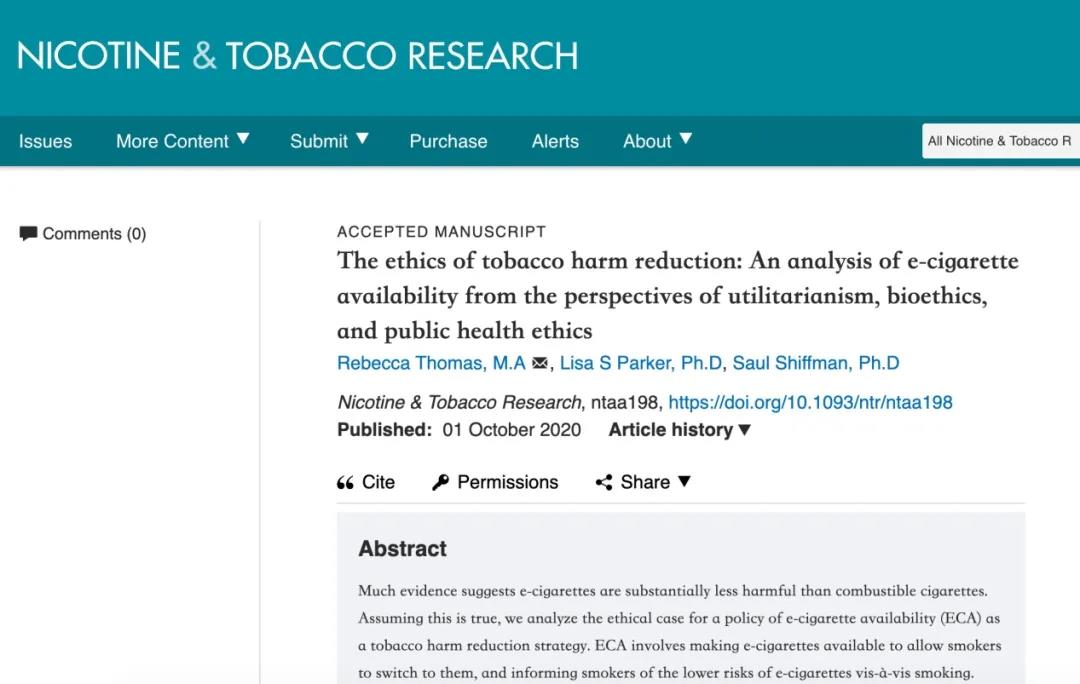The Ethics of Tobacco Harm Reduction: Analyzing E-Cigarette Availability from Utilitarian, Bioethics, and Public Health Ethics
“E-cigarette availability” is a group intervention to encourage smokers to switch to e-cigarettes. It has two meanings: to make it clear to smokers that e-cigarettes are less harmful than cigarettes, and to ensure that they have easy access to e-cigarettes.
The authors of the paper point out that “e-cigarette availability” is supported by two ethical frameworks, public health ethics and biomedical ethics. “E-cigarette availability” can help smokers reduce health risks and harms, and allow smokers to make health decisions by themselves, in line with the principles of respecting individual rights and autonomy, and promoting social fairness and justice. At the same time, achieving public health goals with “e-cigarette availability” encounters the fewest constraints than traditional tobacco control practices.
The biomedical ethics framework has proposed four principles, namely respect for autonomy, benevolence (increasing patient welfare), non-maliciousness (avoiding harm to patients), and justice. Electronic cigarettes are far less harmful than cigarettes, and allowing smokers to switch to electronic cigarettes can help smokers avoid the harm caused by traditional tobacco, so it conforms to the principles of benevolence and non-maliciousness.
More importantly, this solution also fully meets the ethical need to respect the principle of autonomy.
Respect for autonomy refers to respecting the right of individuals to make informed decisions according to their own wishes. Providing e-cigarette products and e-cigarette harm reduction information for smokers can ensure that smokers can make choices voluntarily according to their own values and preferences without any coercion and deception, which is a manifestation of respecting the rights of smokers.
The public health ethics framework has always emphasized that the achievement of public health goals should minimize violations of individual rights and freedoms. Even smokers who started to quit smoking in their later years have the right and freedom to pursue harm reduction. Their rights also need to be protected.
“Everyone has the right to pursue their own definition of happiness, and we should respect whether smokers decide to quit smoking or switch to e-cigarettes,” said Rebecca Thomas of the University of Pittsburgh and one of the authors of the paper.
Since the individual rights of smokers should be respected, it is particularly important to provide accurate e-cigarette information to ensure that smokers make informed decisions.
Take the U.S. lung disease reported by the media last year as an example. At that time, it was confirmed that the cause of this incident was the use of illegally added THC (tetrahydrocannabinol, a high-concentration chemical extracted from industrial hemp) black market cigarettes. Oil, has nothing to do with regular electronic cigarettes. The US Centers for Disease Control and Prevention of the CDC once ignored the conclusions of the study and blamed ordinary e-cigarettes for the cause, and did not correct the relevant information until March this year.
The author believes that this approach seems to protect consumers, but in fact it does more harm than good: “Not only does it allow smokers who have switched to e-cigarettes to smoke again, but it does not prevent everyone from avoiding the real culprit – black market THC products.”
The Public Health Ethics Framework states that the least restrictive interventions should be used to achieve public health goals. As far as tobacco harm reduction goals are concerned, the provision of e-cigarettes to smokers is less restrictive than banning the sale of e-cigarettes and all tobacco products, and thus meets their ethical needs.
In addition, providing smokers with e-cigarette products and e-cigarette harm reduction information can also provide vulnerable groups with cheaper harm reduction programs, reduce social health disparities, and promote social justice.
According to the World Health Organization, tobacco kills more than 8 million people every year, and tobacco harm reduction is imperative. “Abundant evidence shows that e-cigarettes are much less harmful than cigarettes, and both the public health ethics framework and the biomedical ethics framework demonstrate that the availability of e-cigarettes is ethical and a beneficial move, so smokers should be encouraged to switch to e-cigarettes,” the paper states.
Post time: Nov-18-2021




